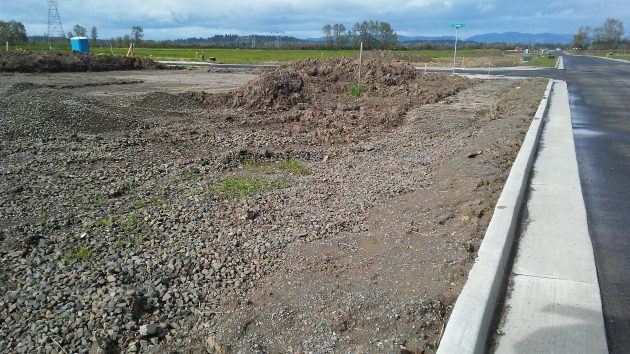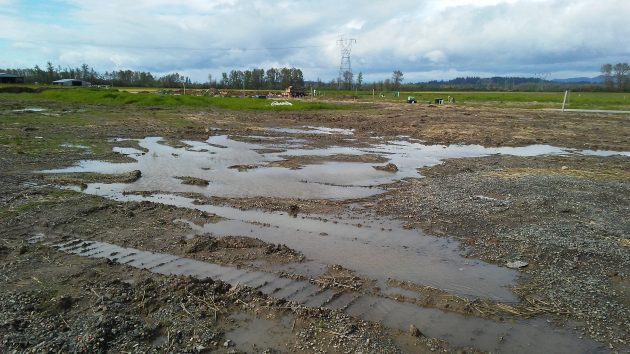
The streets are finished and lots are ready to be developed in this subdivision off Woods Road in Millersburg.
The saga of Oregon’s regulation of dry land as “waters of the state” continues, this time in Millersburg, where the Department of State Lands has taken enforcement action on two subdivisions.
Charles P. Redon, aquatic resource coordinator of the department, issued a cease-and-desist order on April 7 against the Eagle’s Nest Subdivision off Millersburg Drive on the grounds that “fill and removal” had taken place “in or near wetlands” on the property. He followed up on April 11 with the same order against the Woods Estate Subdivision off Woods Road.
Both subdivisions had gone through the Millersburg land-use approval process, and the city and the respective developers had relied on maps showing no wetlands on the properties, according to City Manager Steven Hasson. After a meeting with state officials last week, Hasson understands that a DSL inspector had driven past the subdivisions and, based on Google maps, suspected that wetlands may have been present
Woods Estate has been developed with 51 recorded tax lots, and building permits have been issued on 10. Eagle’s Nest has 42 recorded lots, with 15 building permits ready to be picked up.
“Why would DSL target a site after the infrastructure was in place — and after the developer had expended hundreds of thousands of dollars in development expenses?” Hasson said in a memo he shared with me.
Oregon law prohibits removing or filling more than 50 yards of material within the bed or banks of “waters of the state” in order to protect navigation, fisheries and recreation. Over the years state officials have interpreted this to include so-called wetlands, by which the state means normally dry land containing certain plants and soils. On the federal level, the same regulations exist.
Violating the cease-and-desist orders may lead to penalties of up to $10,000 per day as well as criminal prosecution, the state orders point out.
Hasson said that in the meeting with DSL officials in Salem, he learned that relying on existing wetlands maps does not guarantee that construction activity complies with state regulations. “Essentially, a developer may do everything right and be wrong,” Hasson wrote, “and this approach brought to mind Franz Kafka’s writings.”
I went to take a look at the neighborhood of these subdivisions on Saturday. Nothing was going on, of course. Hasson says the city will keep issuing building permits in the subdivisions, but he’ll warn builders of the DSL wetlands edict. (hh)

Puddles on a Millersburg construction site: Waters of the state?

How old are the “existing wetlands maps?”
Should hardly matter.
Would make a huge difference IMO…
Cue the Kafka quotes…
“Start with what is right rather than what is acceptable.” – F. Kafka
Fitting of this localized story as well as national ones.
Sadly, this goes beyond Kafka and the absurdities in his fictional world.
Oppression from bureaucracies at every level of government is real.
You don’t have a chance. The bureaucracy is always right, even when it’s wrong.
It’s only fun when you pit one bureaucracy against another. I experienced this first hand with Albany and the State. It was quite entertaining.
It is interesting that Mr. Hering employs a Kafka-esque reference in his retelling of this story.
Of course, we do not learn, via Hering’s screed, whether or not the Brave Developers actually consulted with anyone once the Millersburg Experts signed off on their rape of Oregon wetlands. It makes sense that Millersburg Officialdom would be the Final Word on all subjects. So, why wouldDevelopers bother? Once you’ve been inadequately green-lighted, even if you short-circuited the process, then why not just go ahead? It is easier to ask forgiveness than permission….just ask Kafka.
You have my permission to your opinion. May I ask for yours to pee on your wetland?
Even the developers had researched the wetlands they would have logically and reasonably assumed the existing wetlands maps were correct. The state made their assessment based on a driveby view and a look at some “Google maps”. This is a fine example where “the process is the punishment”. The bureaucrats will win regardless because the time loss, legal costs, and lost sales will force the developers to concede. Of course if the developers sue and win their case, it is the taxpayers who will pay the cost. It would be nice if bureaucrats had some skin in the game too – like fines or firings.